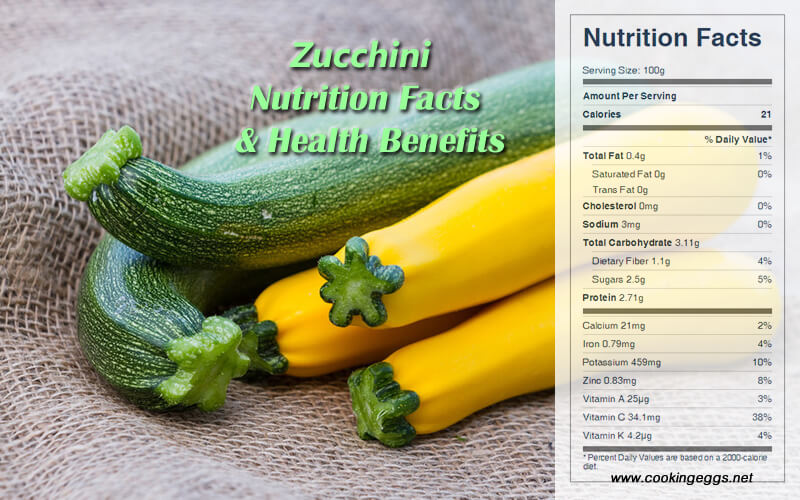Zucchini Nutrition Facts & Health Benefits
Zucchini is a summer squash. It is one of the low-calorie vegetable, usually cooked and eaten as a savory dish or accompaniment.
Ordinary zucchini fruits are any shade of green, though the golden zucchini is a deep yellow or orange.
When used for food, zucchini are usually picked when under 20 cm in length, when the seeds are still soft and immature. A zucchini with the flowers attached is a sign of a truly fresh and immature fruit, and it is especially sought after for its sweeter flavor.

The nutritional value of zucchini
Zucchini is low in food energy and high in folate, potassium, provitamin A, and vitamin C.
One cup of sliced raw zucchini provides 18 calories, 3.8 g carbohydrate, 1.6 g protein, 0.2 g fat, 1.6 g dietary fiber, 442 IU vitamin A, 12 mg vitamin C, 28 mcg folic acid, 322 mg potassium, 4 mg sodium, 42 mg phosphorus, 20 mg calcium, and 28 mg magnesium.
Raw Zucchini Nutrition Facts Label
Health Benefits of Zucchini
Zucchini provides vitamins A and C, folate, potassium, manganese, lutein, and beta-carotene. Despite being 95% water and 4% carbohydrate, zucchini is a low-calorie source of antioxidants, anti-inflammatories, and phytonutrients that help protect vision.
It is an excellent source of potassium, an important intra-cellular electrolyte. Potassium is a heart-friendly electrolyte and helps bring a reduction in blood pressure and heart rate by countering the pressure effects of sodium.
The manganese in zucchini is a vital cofactor in a number of enzymes, including some that help cells maintain their shape and others that are essential to metabolic processes. Manganese ions are essential to the process of neutralizing superoxide free radicals, which are quite toxic.
Zucchini is rich in fiber, and eating zucchini can promote gastrointestinal motility and prevent and control constipation. Its peel is an excellent source of dietary fiber that helps ease constipation and offers some protection against colon cancer.
Golden skin zucchini is rich in flavonoid polyphenolic antioxidants such as carotenes, lutein, and zeaxanthin. These compounds help scavenge harmful oxygen-derived free radicals and reactive oxygen species from the body that play a role in aging and various disease processes.
Zucchini contains fenugreek alkaloids that can promote insulin secretion and can prevent and improve diabetes.
Because summer squash are immature, they are considerably lower in nutritional value than their winter counterparts. Generally, there is little variation in nutritional value between varieties. The peel is where many of the nutrients hide, so never peel summer squash.
Summer squash can be grilled, steamed, boiled, sauteed, fried or used in stir-fry recipes. They mix well with onions, tomatoes, and okra in vegetable medleys. Summer squash can be used interchangeably in most recipes. Tiny baby squash can be used as appetizers, or left whole and sauteed with other vegetables.
Note: Members of the plant family Cucurbitaceae, which includes zucchini, pumpkins, and cucumbers, can contain toxins called cucurbitacins, making them extremely bitter and causing severe gastro-enteric upsets.